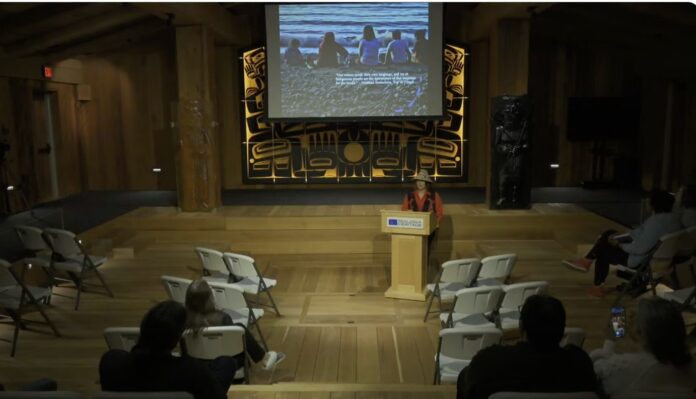Barbara Blake, vice president of the Ocean Conservancy, former Juneau Assembly member, and former aide to former Gov. Bill Walker, delivered an address Friday, during which she proposed that an oral tradition of Natives should be considered the “Indigenous Law of the Sea,” and that salmon are relatives to Alaska Natives.
Her talk, titled “Weaving the Currents: Writing an Indigenous Law of the Sea,” challenged attendees to reconsider global approaches to ocean and environmental stewardship and instead acknowledge the primacy of indigenous people, and how they should ” dictate” how the sea, rivers, and land are managed. She was not specific when it came to explaining how China and Russia would go along with it, or how the other 8 billion people living on Planet Earth would agree to indigenous primacy.
Speaking to a sparsely attended room at the Sealaska Heritage Institute’s Spring Lecture Series, Blake emphasized that what she calls “an Indigenous Law of the Sea” is not a new framework, but a long-standing system of governance rooted in Native traditions and values, all through oral tradition. Indigenous law is the real law, she said, even if it is not written down.
“The laws that we carry and the laws that underpin how we treat the ocean, how we treat the waters, how we treat our beyond human relatives are the laws how we operate in the world,” Blake said. “They’re not written down like the laws you see in the Constitution of the United States or the Constitution of the State of Alaska. They’re handed down from generation to generation.”
She described this body of law as one of remembrance and reconciliation, not innovation. “Thinking about this work is not creating new law, but it’s a remembrance and it’s a reconciliation of the law that we always carried,” Blake said. “Just re-instituting the law that governed this place for a millennia.”
Blake urged the audience to imagine a world where these Indigenous laws and values were not only remembered, but actually were dictates. “What would it look like today if we pulled those laws forward into maybe a written form, maybe a verbal form, and the rest of the world said yes, we will abide by those laws as well?” she asked.
It was toward the end of her lecture when she repeatedly called salmon the relatives of indigenous people. Here’s the clip of her talking about them as relatives (not visible on mobile phones, sorry):
Blake also quoted Jonathan Samuelson, a Yup’ik and Tlingit presenter who participated in the recent Indigenous Law of the Sea gathering.
“Our waters speak their own language,” Samuelson was quoted as saying, “and we as indigenous people are the interpreters of that language for the world.”
Blake, too, said only indigenous people could interpret the water.
Blake explained how Indigenous communities, by spending time on the waters and land, are attuned to changes brought by climate change, unlike non-Natives. “The ocean is speaking to us. Our rivers are speaking to us. Our land is speaking to us. And what are those things telling us? What are our salmon relatives telling us about how the world is being treated?” she asked.
Throughout her lecture, Blake said indigenous peoples have a duty to what she called “our beyond human relatives.”
Presumably salmon, but no one in the audience questioned why they are eating their relatives.
“We know we have a responsibility to our oceans … our waters and our lands and our beyond human relatives,” she said. “That has been our responsibility that has been passed down for generations.”
“For thousands of years we’ve carried all this knowledge—15,000 years carbon-dated proof of existence in this place. We know our stories go back before that,” Blake said. “Our stories of creation are from these lands and from these waters.”
She also said that indigenous babies are born with the knowledge of this law.
She made the argument that it’s time to write down the “laws” and then get the world to agree to them.
Blake acknowledged that indigenous people have different “laws,” depending on where they live and that each of these sets of “laws” are legitimate.
Watch the one-hour lecture here:
